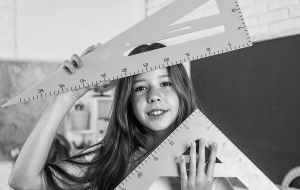November 29, 2022
by Patricia Tomasi
 A new study published in the Journal of Child Development looked at developmental changes in students’ use of dimensional comparisons to form ability self-concepts in math and verbal domains.
A new study published in the Journal of Child Development looked at developmental changes in students’ use of dimensional comparisons to form ability self-concepts in math and verbal domains.
“We know that adolescent students may compare their math performance with their own reading performance to determine whether they are a ‘math person’ or ‘reading person’,” study author Sirui Wan told us. “My team wanted to know when the tendency of this comparison shows up and whether the tendency changes as students progress through their K-12 years.”
Math and reading scores for nine-year-olds fell drastically during the COVID-19 pandemic according to the National Centre for Education Statistics. Students' abilities declined by five points in reading and by seven points in math.
Researchers expected students’ tendency of comparing their own math and reading performance would become more pronounced as students progress through their K-12 years because the potential pressure to specialize in later school years.
“I was interested in how people find their niche,” Wan told us. “Students’ academic identity (e.g., I am a “math person”) can predict their future college major and career choices. So I started to study how students form and develop their academic identity.”
Researchers used a dataset that a group of students were followed from Grade 1 to Grade 12. Every few years, all the students were asked to answer questions such as “How good are you at math [reading]”, “How good are you at math [reading], compared to other activities and subjects?”, and “If you were to list all the students from best to worst in math [reading], where are you?” They then compared students’ answers to these questions across years and among these questions.
“We found that during primary school, students who reported high confidence in language arts were also likely to report high confidence in math, no matter whether they were asked to compare with other subjects or compare with other students,” Wan told us. “In high school, students who reported high confidence in language arts were also likely to report high confidence in math when they were asked to compare with other students. However, when high school students were asked to compare with other subjects, those who reported high confidence in language arts reported lower confidence, on average, in math, and vice versa.”
Researchers believe the results make sense but they would never know whether the pattern they found is true or not if they did not conduct the study.
“We still know very little about what is causing the pattern we found,” Wan told us. “One guess is that students in high school face pressure to specialize so they compare their math performance with their own reading performance to identify their own relative strengths and weaknesses. It’s likely there are other reasons such as ability grouping at school. Future research is needed to explore all potential reasons.”
About the Author
 Patricia Tomasi
Patricia Tomasi
Patricia Tomasi is a mom, maternal mental health advocate, journalist, and speaker. She writes regularly for the Huffington Post Canada, focusing primarily on maternal mental health after suffering from severe postpartum anxiety twice. You can find her Huffington Post biography here. Patricia is also a Patient Expert Advisor for the North American-based, Maternal Mental Health Research Collective and is the founder of the online peer support group - Facebook Postpartum Depression & Anxiety Support Group - with over 1500 members worldwide. Blog: www.patriciatomasiblog.wordpress.com
Email: tomasi.patricia@gmail.com